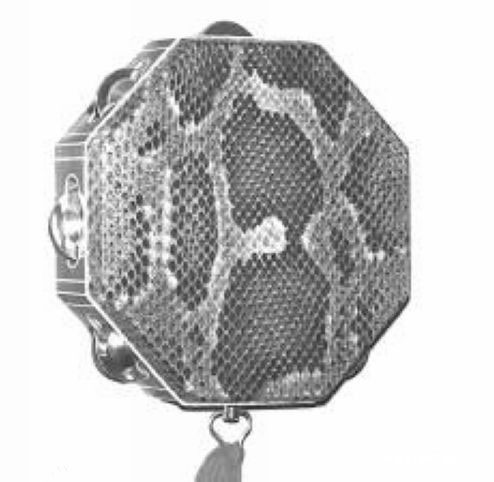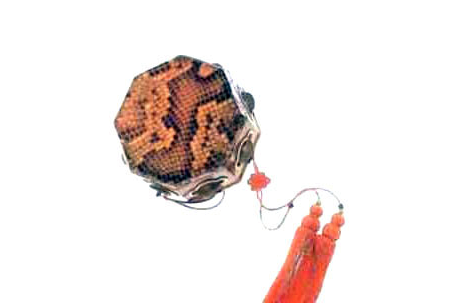The history of the octagonal drum
814 views · Organized by 黑猫不是喵 on 2022-02-14
In the long river of traditional opera in Beijing, the octagonal drum is a folk art that is as famous as the Beijing-style art such as Chaqu, Beijing rhyme drum and single string. However, in the past ten years, due to the impact of modern art, the folk art has declined, and there is a lack of successors. Talents who understand and love This art has fewer and fewer audiences.
"Octagonal drums, jingle bells, eight big flags planted in all directions. Big flags, soldiers marching, my love is rooted in Zhenghuang. Yellow helmets, yellow armors, yellow shirts, yellow saddles, yellow horses, and yellow bells. …"
This is a Manchu love song called "Receiving Love Roots". It describes the song sung by the wives when their wives welcomed their husbands when they defended the motherland's territory and bravely defeated the Rakshasa (i.e. Tsarist Russia). The octagonal drum is the most distinctive folk musical instrument of the Manchu people. According to legend, the early octagonal drum was an accompaniment instrument used by the ancient Manchu people for self-entertainment. It is also said that it is inlaid with the best wood from the eight leaders of the Eight Manchu Banners, and its eight sides symbolize the unity of the Eight Banners of Manchu. The eight woods are joined together to obtain anise, so it is called the octagonal drum.
The octagonal drum was created by the children of the Eight Banners in Beijing in the middle of the Qianlong period. Due to the advocacy of the emperor and the intervention of literati, it improved its social status and artistic taste. It was sung in the palace and flourished for a while. During the Daoguang period, Chaqu entered the society and formed a style that both refined and popular enjoyed, which is the historical and cultural testimony of the fusion of the Manchu and Han nationalities.
In the early years of Qianlong, the children of the Eight Banners in the capital created a book of children written in Chinese and rhymed according to the end of Chinese on the basis of traditional folk songs. During the same period, the children of the Eight Banners sang the octagonal drum in addition to singing the single Chaqu and the beginning of the Chaqu. The tail, absorbs a lot of song cards, such as couplets. It contains popular songs from various places that have been Beijingized.
At that time, the soldiers who went on the expedition returned triumphantly, were enjoined to receive the "Dragon Ticket" issued by the Ministry of Internal Affairs, and compose "victory lyrics" inside and outside the banner camp. In fact, they set off a mass cultural wave to promote the emperor's martial arts from the army. The octagonal drum is like a gust of wind, blowing from the suburbs of Beijing to the inner city, from the banner camp to the upper class of the imperial capital, and for a while, it has become an important part of life in the capital.
As an accompaniment instrument, the shape of the octagonal drum also has political regulations and interpretations. For example, the octagonal symbolizes the eight flags; the two drooping long ears symbolize the wheat and the two ears, and the grain is prosperous; Octagonal Drum" has also become a general term for a series of singing forms based on Chaqu.
During the reign of Emperor Guangxu of Tongzhi, "the Empress Cixi was especially fond of the 'octagonal drum' lyrics, and once ordered the head of the Ministry of Internal Affairs to approve the children of the flag who were good at this way, and enter the palace to teach the eunuchs to sing." The court system influenced the atmosphere of the capital. First, it improved the literary status of Chaqu and attracted a group of Manchu literati to participate in the creation and singing of the octagonal drum Chaqu. The second is to improve the social status of Chaqu.
"Octagonal drums, jingle bells, eight big flags planted in all directions. Big flags, soldiers marching, my love is rooted in Zhenghuang. Yellow helmets, yellow armors, yellow shirts, yellow saddles, yellow horses, and yellow bells. …"
This is a Manchu love song called "Receiving Love Roots". It describes the song sung by the wives when their wives welcomed their husbands when they defended the motherland's territory and bravely defeated the Rakshasa (i.e. Tsarist Russia). The octagonal drum is the most distinctive folk musical instrument of the Manchu people. According to legend, the early octagonal drum was an accompaniment instrument used by the ancient Manchu people for self-entertainment. It is also said that it is inlaid with the best wood from the eight leaders of the Eight Manchu Banners, and its eight sides symbolize the unity of the Eight Banners of Manchu. The eight woods are joined together to obtain anise, so it is called the octagonal drum.
The octagonal drum was created by the children of the Eight Banners in Beijing in the middle of the Qianlong period. Due to the advocacy of the emperor and the intervention of literati, it improved its social status and artistic taste. It was sung in the palace and flourished for a while. During the Daoguang period, Chaqu entered the society and formed a style that both refined and popular enjoyed, which is the historical and cultural testimony of the fusion of the Manchu and Han nationalities.

In the early years of Qianlong, the children of the Eight Banners in the capital created a book of children written in Chinese and rhymed according to the end of Chinese on the basis of traditional folk songs. During the same period, the children of the Eight Banners sang the octagonal drum in addition to singing the single Chaqu and the beginning of the Chaqu. The tail, absorbs a lot of song cards, such as couplets. It contains popular songs from various places that have been Beijingized.
At that time, the soldiers who went on the expedition returned triumphantly, were enjoined to receive the "Dragon Ticket" issued by the Ministry of Internal Affairs, and compose "victory lyrics" inside and outside the banner camp. In fact, they set off a mass cultural wave to promote the emperor's martial arts from the army. The octagonal drum is like a gust of wind, blowing from the suburbs of Beijing to the inner city, from the banner camp to the upper class of the imperial capital, and for a while, it has become an important part of life in the capital.
As an accompaniment instrument, the shape of the octagonal drum also has political regulations and interpretations. For example, the octagonal symbolizes the eight flags; the two drooping long ears symbolize the wheat and the two ears, and the grain is prosperous; Octagonal Drum" has also become a general term for a series of singing forms based on Chaqu.

During the reign of Emperor Guangxu of Tongzhi, "the Empress Cixi was especially fond of the 'octagonal drum' lyrics, and once ordered the head of the Ministry of Internal Affairs to approve the children of the flag who were good at this way, and enter the palace to teach the eunuchs to sing." The court system influenced the atmosphere of the capital. First, it improved the literary status of Chaqu and attracted a group of Manchu literati to participate in the creation and singing of the octagonal drum Chaqu. The second is to improve the social status of Chaqu.
Involving musical instruments
The octagonal drum (pinyin: bā jiǎo gǔ) is a kind of slap-membrane musical instrument used by the Manchu people for self-entertainment in ancient times. The drum body is flat and small, and the drum surface is octagonal, representing the Eight Banners of the Qing Dynasty at that time. The drum frame is made of eight pieces of ebony, red sandalwood, mahogany, rosewood and bone pieces; it is said that the leaders of the Eight Banners each offered a piece of the best wood inlay. Two to three small copper cymbals are embedded in each of the seven sides of the frame, and one side is inlaid with studs and drum spikes, implying the abundance of grains. It is a traditional form of folk art that is popular among the people.
Guess you like
Organized by 雨童 on 2022-03-21
Bai folk instrumental music mainly includes sanxian music, suona wind and percussion music, cave scripture music, etc. In addition, there are also ancient music and tunes played by bamboo flute, mouth spring, wood leaf and so on.
read >>
Organized by 阿弥 on 2022-03-01
In Qicheng School of Qingzhou City, Zhao Lianju, the inheritor of the octagonal drum intangible cultural heritage project, is telling and playing the octagonal drum "Wind and Rain Returns the Boat" to the children. During the interaction with the inheritors, the students showed great interest in the octagonal drum and started to experience it. Encourage other students to sing along.
read >>
Organized by 花昼 on 2022-02-14
When the children of the banner members of the Qing Dynasty organized the box office to sing the octagonal drum, they also included some other folk arts and acrobatic forms, which were called "quantang octagonal drum", or octagonal drum for short. Waist festival, horse head tune, demolition singing, cross talk, ancient color tricks, etc. It was extended to the Jiaqing and Daoguang years, and songs such as Danxianer and Xiyun were added.
read >>
Organized by 尼禄 on 2022-02-14
The demolition and singing of the octagonal drum was formed in the middle of the Qing Dynasty. Also known as "Brand Song Singing", "Octagonal Drum Band Small Opera", "Brand Opera".
read >>
 渝公网安备 50010702504639号
渝公网安备 50010702504639号